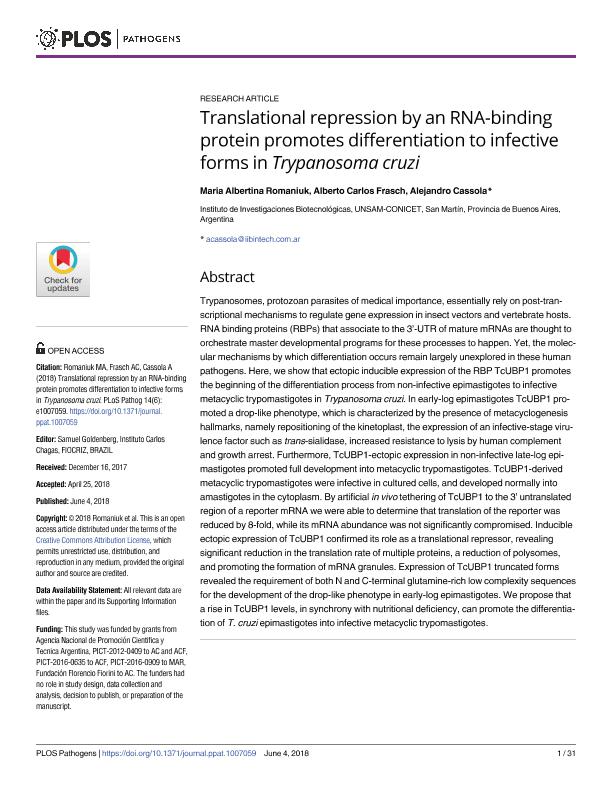Mostrar el registro sencillo del ítem
dc.contributor.author
Romaniuk, María Albertina

dc.contributor.author
Frasch, Alberto Carlos C.

dc.contributor.author
Cassola, Alejandro Carlos

dc.date.available
2020-02-04T20:23:34Z
dc.date.issued
2018-06
dc.identifier.citation
Romaniuk, María Albertina; Frasch, Alberto Carlos C.; Cassola, Alejandro Carlos; Translational repression by an RNA-binding protein promotes differentiation to infective forms in Trypanosoma cruzi; Public Library of Science; Plos Pathogens; 14; 6; 6-2018
dc.identifier.issn
1553-7366
dc.identifier.uri
http://hdl.handle.net/11336/96706
dc.description.abstract
Trypanosomes, protozoan parasites of medical importance, essentially rely on post-transcriptional mechanisms to regulate gene expression in insect vectors and vertebrate hosts. RNA binding proteins (RBPs) that associate to the 3’-UTR of mature mRNAs are thought to orchestrate master developmental programs for these processes to happen. Yet, the molecular mechanisms by which differentiation occurs remain largely unexplored in these human pathogens. Here, we show that ectopic inducible expression of the RBP TcUBP1 promotes the beginning of the differentiation process from non-infective epimastigotes to infective metacyclic trypomastigotes in Trypanosoma cruzi. In early-log epimastigotes TcUBP1 promoted a drop-like phenotype, which is characterized by the presence of metacyclogenesis hallmarks, namely repositioning of the kinetoplast, the expression of an infective-stage virulence factor such as trans-sialidase, increased resistance to lysis by human complement and growth arrest. Furthermore, TcUBP1-ectopic expression in non-infective late-log epimastigotes promoted full development into metacyclic trypomastigotes. TcUBP1-derived metacyclic trypomastigotes were infective in cultured cells, and developed normally into amastigotes in the cytoplasm. By artificial in vivo tethering of TcUBP1 to the 3’ untranslated region of a reporter mRNA we were able to determine that translation of the reporter was reduced by 8-fold, while its mRNA abundance was not significantly compromised. Inducible ectopic expression of TcUBP1 confirmed its role as a translational repressor, revealing significant reduction in the translation rate of multiple proteins, a reduction of polysomes, and promoting the formation of mRNA granules. Expression of TcUBP1 truncated forms revealed the requirement of both N and C-terminal glutamine-rich low complexity sequences for the development of the drop-like phenotype in early-log epimastigotes. We propose that a rise in TcUBP1 levels, in synchrony with nutritional deficiency, can promote the differentiation of T. cruzi epimastigotes into infective metacyclic trypomastigotes.
dc.format
application/pdf
dc.language.iso
eng
dc.publisher
Public Library of Science

dc.rights
info:eu-repo/semantics/openAccess
dc.rights.uri
https://creativecommons.org/licenses/by/2.5/ar/
dc.subject
TRYPANOSOMA
dc.subject
RNA BINDING PROTEIN
dc.subject
DEVELOPMENT
dc.subject
INFECTIVITY
dc.subject.classification
Bioquímica y Biología Molecular

dc.subject.classification
Ciencias Biológicas

dc.subject.classification
CIENCIAS NATURALES Y EXACTAS

dc.title
Translational repression by an RNA-binding protein promotes differentiation to infective forms in Trypanosoma cruzi
dc.type
info:eu-repo/semantics/article
dc.type
info:ar-repo/semantics/artículo
dc.type
info:eu-repo/semantics/publishedVersion
dc.date.updated
2019-10-21T18:37:44Z
dc.journal.volume
14
dc.journal.number
6
dc.journal.pais
Estados Unidos

dc.journal.ciudad
San Francisco
dc.description.fil
Fil: Romaniuk, María Albertina. Consejo Nacional de Investigaciones Científicas y Técnicas. Centro Científico Tecnológico Conicet - La Plata. Instituto de Investigaciones Biotecnológicas. Instituto de Investigaciones Biotecnológicas "Dr. Raúl Alfonsín" (sede Chascomús). Universidad Nacional de San Martín. Instituto de Investigaciones Biotecnológicas. Instituto de Investigaciones Biotecnológicas "Dr. Raúl Alfonsín" (sede Chascomús); Argentina
dc.description.fil
Fil: Frasch, Alberto Carlos C.. Consejo Nacional de Investigaciones Científicas y Técnicas. Centro Científico Tecnológico Conicet - La Plata. Instituto de Investigaciones Biotecnológicas. Instituto de Investigaciones Biotecnológicas "Dr. Raúl Alfonsín" (sede Chascomús). Universidad Nacional de San Martín. Instituto de Investigaciones Biotecnológicas. Instituto de Investigaciones Biotecnológicas "Dr. Raúl Alfonsín" (sede Chascomús); Argentina
dc.description.fil
Fil: Cassola, Alejandro Carlos. Consejo Nacional de Investigaciones Científicas y Técnicas. Centro Científico Tecnológico Conicet - La Plata. Instituto de Investigaciones Biotecnológicas. Instituto de Investigaciones Biotecnológicas "Dr. Raúl Alfonsín" (sede Chascomús). Universidad Nacional de San Martín. Instituto de Investigaciones Biotecnológicas. Instituto de Investigaciones Biotecnológicas "Dr. Raúl Alfonsín" (sede Chascomús); Argentina
dc.journal.title
Plos Pathogens

dc.relation.alternativeid
info:eu-repo/semantics/altIdentifier/url/http://dx.plos.org/10.1371/journal.ppat.1007059
dc.relation.alternativeid
info:eu-repo/semantics/altIdentifier/doi/http://dx.doi.org/10.1371/journal.ppat.1007059
Archivos asociados
